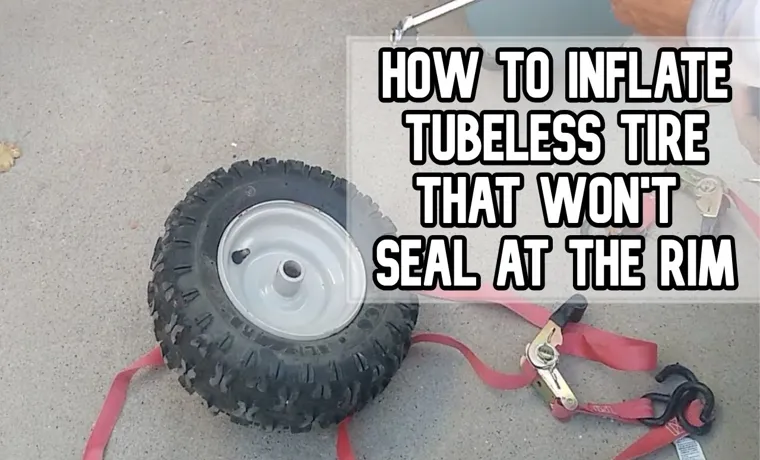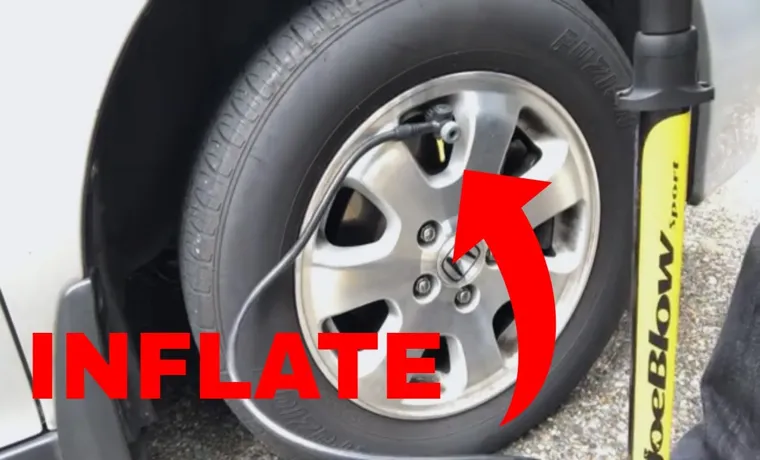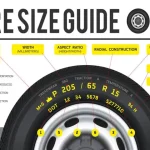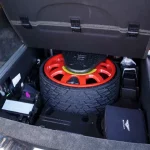Have you ever tried inflating your tire, only to realize that it just won’t budge? It can be a frustrating experience, especially if you’re in a hurry. But fear not, troubleshooting your tire’s inflation problems may be easier than you think. There could be several reasons why your tire won’t inflate, and in this guide, we’ll cover some of the most common causes and how to fix them.
From a faulty valve stem to a punctured tire, we’ll help you diagnose the issue and get back on the road in no time. We’ll also provide some tips on how to avoid future inflation mishaps and keep your tires in tip-top shape. So, grab your tire pressure gauge, and let’s get to troubleshooting why your tire won’t inflate.
Table of Contents
Check the Valve Stem
If you’re having trouble inflating your tire, it’s important to check the valve stem. This small but crucial component can often be the cause of a tire that just won’t hold air. Sometimes the valve stem can become worn or dirty, causing it to leak air or even become completely blocked.
In other cases, it may be that the valve stem is simply loose or has been damaged in some way. Whatever the case, a faulty valve stem can cause significant problems for your tire. Before you try to inflate your tire again, take a close look at the valve stem.
If you notice any issues, it’s important to address them right away. By doing so, you can avoid further problems down the road and keep your tires in top condition, ensuring a safe and smooth ride.
Inspect the valve stem for damage or debris.
When it comes to maintaining your vehicle, checking the valve stem regularly is essential. The valve stem is the part of the tire that allows you to inflate and deflate it, so it’s crucial to ensure that it’s in good working condition. The first thing you need to do is look for any damage to the valve stem.
Signs of damage may include cracks or warping, which can occur over time due to wear and tear. Additionally, you should inspect the valve stem for any debris that may have accumulated. Dirt, rocks, or other small items can get lodged in the valve stem and prevent air from flowing through it properly.
In the worst-case scenario, debris can cause a puncture or damage to the valve stem, which can be dangerous. Checking your valve stem regularly can also help you to detect potential air leaks and address them before they become a bigger problem. By taking care of your valve stem, you’ll ensure that your tires are working correctly and that your vehicle is running smoothly.

Make sure the valve core is securely tightened.
When it comes to checking the valve stem on your vehicle’s tires, it’s important to make sure the valve core is securely tightened. The valve core is the tiny piece inside the valve stem that helps to regulate air pressure. If it’s loose or missing, air can leak out of your tire, resulting in underinflation or even a puncture.
So, when checking your tires, take a few seconds to give the valve stem a gentle tug to make sure the core is snugly in place. If it feels loose, use a valve core tool to tighten it up. This simple step can save you a lot of trouble down the road and keep your tires running at optimal performance.
So don’t skip it!
Check the Tire for Damage
If you’re struggling with inflating your tire, the first thing you should do is check for any damage. A punctured tire can cause significant problems and may prevent the tire from inflating properly. Check the tire for any visible cuts, tears or punctures as these can prevent it from being inflated.
If the tire appears damaged, it’s best not to attempt to inflate it. Instead, take it to a professional or replace it entirely. However, if there’s no obvious damage, move onto the valve stem.
The valve stem is the part of the tire where air is pumped in and out. Ensure that the valve stem isn’t damaged or leaking as this can also prevent the tire from inflating appropriately. By checking for damage to your tire, you can quickly identify whether it needs repairing or replacing, ensuring the longevity of your tires and avoiding any further mishaps.
Look for punctures, cracks, or other damage to the tire.
When it comes to maintaining your vehicle’s tires, it’s important to regularly check them for any signs of damage. Punctures, cracks, or other types of damage can significantly compromise the integrity of the tire, potentially leading to dangerous blowouts or flats while driving. The last thing you want is to be stuck on the side of the road with a flat tire, so it’s crucial to inspect them before hitting the road.
Look for any obvious cracks or punctures on the tire surface, paying close attention to the sidewalls, which are particularly susceptible to damage. If you notice any lingering vibration while driving or an irregular wear pattern on your tire, it could be an indicator of a damaged tire that needs attention. If you’re unsure about the state of your tires, it’s always better to err on the side of caution and consult with a professional for an expert opinion.
By regularly inspecting your tires for damage, you can help ensure a safer driving experience and extend the life of your tires in the long run.
If there is damage, the tire will need to be replaced.
When was the last time you checked your tires for damage? It’s an important step in ensuring the safety of your vehicle and everyone inside. A damaged tire can lead to blowouts, decreased handling, and even accidents. So, it’s essential to check your tires regularly, especially after driving on rough roads or hitting a pothole.
Look for cuts, bulges, or tread wear that is uneven and beyond legal limits. If you see any of these signs, your tire may need to be replaced immediately. Don’t take any chances with your safety or the safety of others on the road.
Remember, the cost of a new tire is a small price to pay compared to a potential accident. Keep yourself and your vehicle safe by checking your tires regularly for damage.
Check the Air Pump or Compressor
If you’re having trouble inflating your car tire, it’s possible that your air pump or compressor may be the culprit. First, make sure that the pump is turned on and properly connected to the tire valve. If there are no obvious issues, try listening for any strange noises coming from the pump or compressor.
If you hear a clicking or buzzing sound, it may be a sign that the motor is malfunctioning and needs to be replaced. Additionally, check the gauge on the pump to make sure that it is reading accurately. An inaccurate gauge may lead to over or under-inflated tires.
Ultimately, if you’re still having trouble inflating your tire, it may be best to take it to a professional mechanic for further inspection.
Make sure it is properly connected and turned on.
When it comes to maintaining your aquarium, checking your air pump or compressor is crucial for ensuring your aquatic pets stay healthy and happy. One of the most common issues aquarium owners face is a malfunctioning air pump or compressor. To avoid this issue, you should check that you have the right size air pump for your tank, and ensure it is properly connected and turned on.
If you notice that your air pump or compressor is not working correctly, you should check the air tubes and air stones for any blockages. Additionally, you can check the air filter for clogs or build-up that could be hindering the flow of air. Remember, a well-functioning air pump or compressor will provide much-needed oxygen to your fish and other aquatic creatures, helping to keep them happy and healthy.
By regularly checking your air pump or compressor, you can avoid potential issues and keep your aquarium looking and feeling great.
Check for any signs of damage or malfunctions.
When it comes to maintaining your aquarium, checking for any signs of damage or malfunctions is essential. One crucial element to pay attention to is the air pump or compressor. These devices are responsible for supplying essential oxygen to the fish and other aquatic creatures in your tank.
If you notice that the pump or compressor is not functioning correctly, it could lead to insufficient oxygen supply, which can be life-threatening for your fish. So, what should you look for when checking the air pump or compressor? Firstly, check for any signs of physical damage, cracks, or wear and tear. Secondly, ensure that the pump is not producing any strange noises, vibrations, or leaks.
Finally, double-check the air tubing to make sure it is properly connected and not clogged. By taking these essential steps, you can decrease the risk of any complications arising due to malfunctioning air pumps or compressors, and ensure a safe and healthy environment for your aquatic pets.
Check the Air Pressure Gauge
If you’re having trouble inflating your tire, the first thing you should check is the air pressure gauge. Using a gauge will give you an accurate reading on the tire pressure and whether or not it needs to be topped up. Low air pressure is the most common reason why a tire won’t inflate.
Make sure to check the recommended psi for your tire; it can be found either on the tire itself or in your vehicle’s owner manual. If you’re using an air compressor, make sure the valve stem and air hose are properly connected to avoid leakage. In addition, cleaning the valve stem and adding a little bit of lubrication can help make the process smoother.
If you’re still having trouble inflating your tire, it may be a sign of a more significant issue such as a puncture or leaks. In these cases, it’s best to take your tire to a professional who can identify and fix the problem.
Make sure it is calibrated properly and the reading is accurate.
Checking the air pressure gauge before using it is crucial to ensure accurate readings. It’s not just about having the right tool; rather, it’s about having a tool that functions correctly. Calibration is a vital part of having an accurate reading, so you must check that your gauge is calibrated correctly.
Check the gauge’s accuracy by comparing its readings to other gauges or some other reference method. This will ensure that your gauge is reliable and providing true readings. Keeping your gauge clean and free from debris will also prevent any incorrect measurements.
Furthermore, monitoring the air pressure gauge often and before every use is an excellent way to ensure your tire pressure is accurate. Over time, air pressure gauges may lose accuracy, so keep an eye on them and have them calibrated regularly. A well-calibrated and accurate air pressure gauge will ensure that your tire pressure is at its optimal level, giving you a safe and smooth ride.
Bring it to a Professional
If you’re struggling to inflate your tire, it can be frustrating and confusing. There are a few reasons why your tire may not be inflating properly, so it’s important to diagnose the issue before attempting any DIY fixes. One common reason for difficulty inflating a tire is a damaged valve stem.
If your valve stem is damaged, it won’t be able to properly hold onto the air hose, resulting in air leakage. In this case, it’s best to take your tire to a professional for a replacement. Another potential issue is a puncture or tear in the tire itself.
This can cause air to escape as soon as you inflate it, making it impossible to maintain the recommended pressure. Again, a professional inspection is the best solution in this scenario. Overall, if you’re struggling to inflate your tire, it’s always a good idea to bring it to a professional who can accurately diagnose and fix the issue.
Keywords: why wont my tire inflate, damaged valve stem, professional inspection.
If you have checked everything and are still having issues, it may be time to bring it to a tire professional.
If you’re experiencing issues with your tires, it’s important to do a thorough check of your tire’s condition. Check for any cuts, punctures or bulges in the tire and ensure that the pressure is at the recommended level. If you’re still having problems, it may be time to bring in a professional.
A tire professional can inspect your tires for any damage or wear and ensure that they’re performing at their best. They can also provide you with advice on tire maintenance and replacement. It’s important to take your tires to a professional if you’re experiencing any issues, especially if you’re unsure of what the problem may be.
Don’t wait until it’s too late – addressing tire problems early on can prevent accidents and costly repairs down the line. So, if you’re having trouble with your tires, bring them to a professional and ensure that you’re driving safely on the road.
Conclusion
After diving deep into the world of tire inflation, it’s clear that there are a multitude of reasons why your tire may not be inflating. It could be a simple issue like a clogged valve stem, or a more complicated problem such as a puncture or damage to the tire itself. Whatever the reason may be, it’s important to address the issue promptly to ensure your safety on the road.
And in the wise words of Benjamin Franklin, “an ounce of prevention is worth a pound of cure” – so don’t forget to perform regular maintenance and check-ups on your tires to keep them in tip-top shape.”
FAQs
What are some common causes for a tire not inflating properly?
Some common reasons why a tire won’t inflate include a puncture or damage to the tire, a faulty valve stem, or a problem with the air compressor or pump.
Can a tire be fixed if it won’t hold air?
It depends on the cause of the problem. If the tire has a small puncture, it can often be repaired by a professional. However, if the tire is damaged or worn out, it may need to be replaced.
How do I check if my valve stem is the problem?
An easy way to determine if the valve stem is the issue is to spray it with soapy water and look for bubbles. If bubbles appear, the valve stem may be faulty and need to be replaced.
Is it safe to drive on a tire that won’t inflate?
It is not safe to drive on a tire that won’t inflate, as this can cause serious damage to the wheel and put the driver at risk of a dangerous blowout or accident.
How often should I check the air pressure in my tires?
It is recommended to check the air pressure in your tires at least once a month, and before any long road trips, to ensure optimal driving performance and safety.
What should I do if I can’t inflate my tire on my own?
If you are unable to inflate your tire on your own, it is best to seek the help of a professional mechanic or tire repair shop who can diagnose and fix the issue properly.
Can extreme weather conditions affect tire inflation?
Yes, extreme heat or cold can cause the air in a tire to expand or contract, leading to changes in tire pressure. It is important to monitor tire pressure during extreme weather conditions and adjust as needed.



